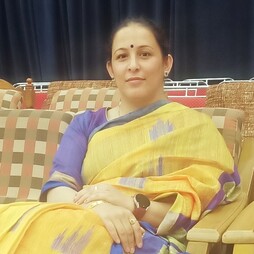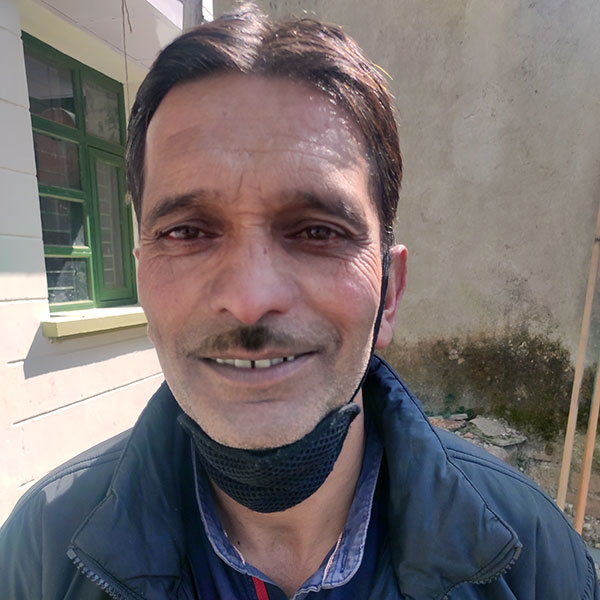The Department of Botany in Rajkiya Kanya MahaVidyalaya (RKMV), Shimla-1 was established in the year 1977 to cater to the needs of students from this region. It was one of the departments started since the inception of the college. The department was established to train the students in various fields of plant sciences. The syllabus designed by the Himachal Pradesh University, Shimla-5 is followed for teaching. Basic botanical courses as well as skills enhancement courses are taught to the students. Students of all the classes visit the fields, forests and research institutes for the practical understanding of the subject. Presently, department has 2 Associate Professors, 1 Assistant Professors and 2 Laboratory Staff members.
Many stalwarts in the field of botany served the department, who later on, were promoted to the post of principals. One of the faculty members, Dr. Shyam Sunder, rose to the post of the Director of Higher Education, Government of Himachal Pradesh. Many students of this department have taken up teaching and research as their profession.
Eligibility
| Programme/ Course/Level | Duration | Eligibility | Admission Procedure |
|---|---|---|---|
|
UG
B.Sc. Pass Course with Botany as one of the
Subject
|
3 Years
|
10+2 with Biology, Chemistry, Physics &
English
|
On Merit Basis
|
Present Faculty

Indu Chauhan
Assistant Professor| Name | Academic Qualifications | Designation | Teaching Experience | E-mail ID |
|---|---|---|---|---|
|
Indu Chauhan
|
M.Sc. ,B.Ed, M.phil., Ph.D currently
pursuing (H.P.U, Shimla)
|
Assistant Professor
|
5 Years
|
chauhan.indu17@gmail.com
|
Laboratory Staff

Ganga Ram Chauhan
Laboratory AttendantStudent Enrolment in Botany
| Year | Student Enrolled |
|---|---|
|
B.Sc. 1st Year
|
75
|
|
B.Sc. 2nd Year
|
59
|
|
B.Sc. 3rd Year
|
48
|
Courses Offered in the Department
| Year | Discipline Specific Courses (DSC) | Skill Enhancement Courses (SEC) | Discipline Specific Electives (DSE) |
|---|---|---|---|
|
B.Sc. 1st Year
|
|
||
|
B.Sc. 2nd Year
|
|
|
|
|
B.Sc. 3rd Year
|
|
|
Course Outcome
| Name of the Course | Course Outcome |
|---|---|
|
Biodiversity(Microbes,
Algae, Fungi and Archegoniates)(BOTA 101)
|
This course introduces students to the biodiversity found in
microorganisms (viruses, bacteria), algae, fungi and archegoniates
(Bryophytes, Pteridophytes & Gymnosperms). The students, after
completing this course, will be able to understand morphology,
structures, distribution patterns, life cycles and the economic
importance of biodiversity. Through field studies, students will be able
to understand how these plants grow in nature and they will become
familiar with the local diversity of plants.
|
|
Plant Ecology and Taxonomy (BOTA
102)
|
This course is designed to enable the students to understand basic
ecological concepts, interactions between the living organisms and with
their environment and concepts of taxonomy. After successful completion
of the course, the student will have adequate knowledge about vegetation
types and their analysis, ecosystems, nutrient cycling and types of
soils. Through taxonomy, students will be able to understand the basic
principles of plant identification, nomenclature and classification.
They will also become well-versed with the techniques of herbarium
preparation, modern trends in taxonomy and the importance of plant
families.
|
|
Plant Anatomy and
Embryology(BOTA 201)
|
This course will enable the students to understand the internal
organisation of plants and the reproductive methods in the plant
kingdom. After the completion of the course, students will be able to
know the kinds of cells and tissues present in different parts and
regions of the plants. They will be able to understand the basis of
growth and development. Plant embryology will acquaint the students with
pollination syndrome, developments of embryos, seeds and the dispersal
strategies in flowering plants.
|
|
Plant Physiology and Metabolism
(BOTA 202)
|
This course is designed to understand the functional aspects of plant
life. After the completion of the course, students will be able to
understand the functional processes such as water and mineral uptake and
transport, assimilation of organic food through photosynthesis,
generation of energy through respiration, regulation of various life
processes through hormonal control and the role of light and temperature
in flowering. They will also be able to understand the role of various
growth regulators in obtaining higher crop yields, clonal multiplication
through rooting and production of off-season flowers and fruits.
|
|
Economic Botany and
Biotechnology (BOTA 301)
|
This course seeks to familiarise the students with various economic
plants such as cereals, pulses, vegetables, oil seed crops, beverages,
sugar and fibre yielding plants, medicinal plants, various molecular
biology techniques and crop biotechnology. After completing the course,
students will have a thorough understanding of different economic
plants, their cultivation methods and conditions required their farming.
They will also learn the methods of tissue culture and production of
transgenic plants.
|
|
Cell and Molecular Biology (BOTA
303)
|
This course deals with the cellular and molecular organisation of the
living organisms. After completing the course, students will be able to
understand the cellular and molecular basis of life and how the various
life processes are controlled by the DNA. They will also be able to
understand the regulatory mechanisms inside the tiny cells which control
the heredity and well-being.
|
|
Biofertilizers(BOTA 203)
|
Organic farming has become need of the hour in the present time of
increasing soil pollution. The course is designed to educate the
students on the organic farming, biodegradable waste management and
production and use of biofertilizers. After completing this course,
students will be able to able to practice organic farming by using
organic manures and biofertilizers. They can also set-up their
biofertilizer units and market them to earn livelihood.
|
|
Gardening and Floriculture(BOTA
204)
|
Home gardening has become a household activity in the recent times. The
demand for cut and loose flowers has grown exponentially, paving a way
for the development of multifaceted commercial floriculture industry.
The students of this course will learn about the various ornamental
plants for home gardening as well learn methods of cultivation of
commercially important ornamental plants. They will also be able to
organise various types of floral arrangements and prepare artefacts from
dried agricultural wastes. This can provide them opportunities to earn
their income by setting up their floricultural farms.
|
|
Medicinal Botany and Ethnobotany
(BOTA 306)
|
Plant-based medicines are on the path of revival in the 21st century due
to their less side effects. After completing this course, students will
be able to know about the medicinal uses of various plants, their
cultivation, significance of traditional knowledge in drug discovery,
conservation of biodiversity of medicinal plants and intellectual
property rights related to the plant wealth.
|
|
Mushroom Cultivation Technology
(BOTA 307)
|
This course is designed to familiarize the students with various aspects
of mushrooms. After completing the course, students will be able to know
about the cultivation technology of various mushroom species and how
they can be processed for long term storage. They will be able to earn
their livelihood through mushroom cultivation.
|
Infrastructure Facilities
Department has two well equipped laboratories with the following equipments:
|
Laminar Air Flow Cabinet
|
Spectrophotometer
|
Binocular Microscopes with LCD
|
|
Incubator
|
Microwave Oven
|
Dissecting Microscopes
|
|
Centrifuge
|
PH meter
|
Compound Microscopes
|
|
Autoclave
|
Water Bath
|
Multimedia Projector
|
|
Computers
|
Interactive Board
|
Computers
|



